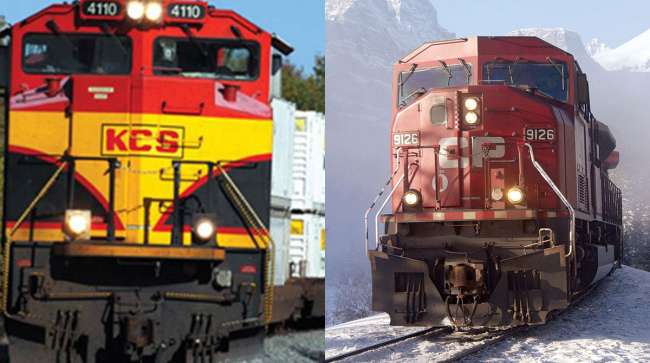Laredo Morning Times, Texas
STB Says ‘Train Noise’ Would Be Only Negative Impact of CP-KCS Merger

[Stay on top of transportation news: Get TTNews in your inbox.]
The Surface Transportation Board’s Office of Environmental Analysis determined the only potential adverse impacts of Canadian Pacific’s proposed merger with Kansas City Southern would be train noise, according to the STB’s Draft Environmental Impact Statement released Aug. 5. All other impacts were described as negligible, minor and/or temporary.
STB announced its findings as part of a 357-page document, which details its research into potential impacts caused by the proposed merger including freight and passenger rail safety, grade-crossing safety, grade-crossing delay, truck-to- rail diversion, traffic at intermodal facilities, noise and vibration, air quality and climate change, energy, cultural resources, hazardous materials release sites, biological resources, water resources, environmental justice and other cumulative impacts.
Now that STB has announced its findings, OEA is providing a 45-day public comment period beginning Aug. 12 and ending Sept. 26 to weigh in on the Draft EIS.

Creel
Canadian Pacific first agreed to merge with Kansas City Southern in September 2021. The agreement went through several roadblocks before being finalized Dec. 14 following the approval of shareholders on Dec. 8 and 10, respectively.
Upon potential approval by STB, which the companies expect to come in the fourth quarter of 2022, the railroads expect to achieve full integration over the next three years.
“Today is a historic day for our two iconic companies,” CP president and CEO Keith Creel said in December. “CPKC will become the backbone connecting our customers to new markets, enhancing competition in the (United States) rail network and driving economic growth across North America while delivering significant environmental benefits. We are excited to reach this milestone on the path toward creating this unique truly North American railroad.”
“We are excited for the possibilities that will open to us through this combination with CP, and we look forward to our next chapter,” KCS President and CEO Patrick Ottensmeyer added.

Ottensmeyer
This potential merger would give CP and KCS control of Kansas City Southern de México, which is the only railroad serving the Mexican side of the critically important Laredo Gateway, according to a filing by Union Pacific.
UP gave a 343-page filing to STB in March detailing how the merger could actually lead to competition issues at the Port of Laredo, which was the nation’s leading U.S.-International Gateway in 2019, moving $226.8 billion in cargo including 264,406 loaded rail containers crossing from Mexico to the U.S., an increase of 282% from 69,204 loaded rail containers in 1996.
“The board recognized long ago that rail competition via the Laredo Gateway must be protected, because other gateways and other modes do not provide effective alternatives,” the filing reads. “KCS’s right to operate from Kansas City to Laredo exists only because the board concluded in 1996 that the Laredo Gateway ‘occupied a position of separate and surpassing economic significance’ to U.S.-Mexico rail transportation.”
The filing posits such a merger would give the companies the “ability to increase the costs or reduce the quality of rail service in Mexico for railroads providing shippers competitive options to CPKC north of Laredo. CPKC would have a strong incentive to engage in this type of anticompetitive conduct: to meet applicants’ aggressive promises to investors, CPKC must divert substantial volumes of business from shippers currently using UP or BNSF to provide service north of Laredo without sacrificing profits.”
While receiving testimony in July, several other companies echoed UP’s concerns with the merger and the Laredo area including the aforementioned BNSF.
“Unless the transaction is appropriately conditioned, CP-KCS will be able to foreclose cross-border traffic from competitors by manipulating rates on the bottleneck segment of the cross-border movements through the Laredo gateway,” attorneys for BNSF said.
The attorneys went on to say the merged company could “lock out the Laredo Gateway from competitors.”
Several other issues were brought up as well including one in Houston as well as in Minnesota, but the merging companies disagreed with the assessments of the other dissenting entities.
Want more news? Listen to today's daily briefing above or go here for more info
“The most vehement opposition to the transaction comes not from shippers but rather from the Class I railroads who will compete most directly with the new transportation services that the CP/KCS transaction will enable,” attorneys for CP said. “Their opposition, and the self-serving conditions they seek, are not motivated by any need to protect the public interest from harm but by desire to protect themselves from change — i.e., the new, more intense competition CPKC will provide — or to get something valuable for themselves in the process. The board should reject their efforts.
“(They) are missing the forest for the trees: Whatever measure of success CPKC achieves, the combination of the end-to-end CP and KCS networks will be a catalyst for investment in a new and improved North-South rail option that will inject new competition into the industry. If it really were the case that CPKC’s estimates were wildly off base, and the Class I railroads did not expect much of their own traffic to be diverted to the CPKC network, they would not be objecting so vigorously.
“It is telling that the Class I railroads say nothing about their own competitive responses to CPKC. Their preferred strategy is to prevent new competition from CPKC from ever getting off the ground, using regulatory tools, rather than meeting CPKC in the marketplace.”
Distributed by Tribune Content Agency, LLC



